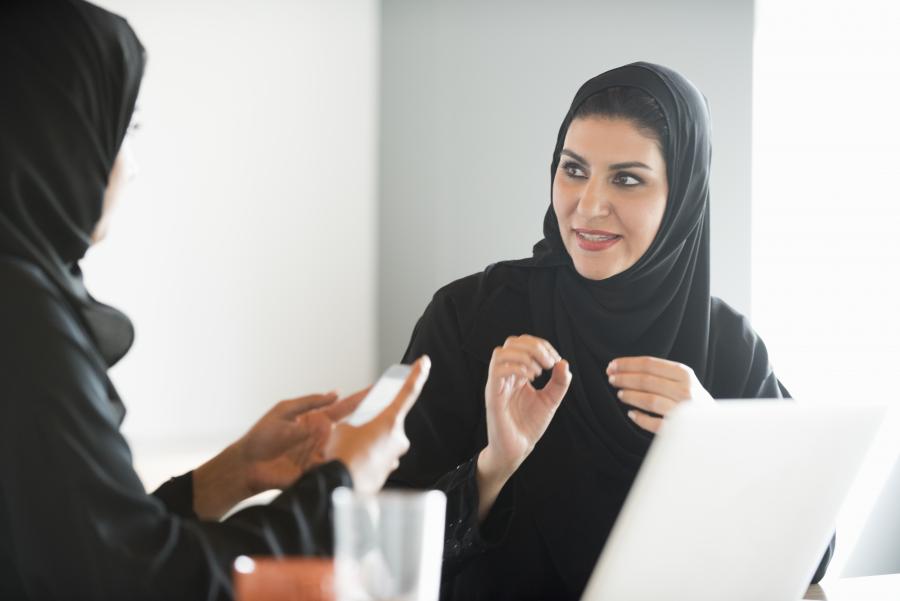- About
- Admissions
- Study at AUS
- Prospective Students
- Bachelor's Degrees
- Master's Degrees
- Doctoral Degrees
- Admission Publications
- International Students
- Contact Admissions
- Grants and Scholarships
- Sponsorship Liaison Services
- Testing Center
- New Undergraduate Student Guide
- Undergraduate Orientation
- New Graduate Student Guide
- Graduate Orientation
- File Completion
- Payment Guide
- Students with Disabilities
- Executive and Continuing Education
- Academics
- Life at AUS
- Research
- Contact Us
- Apply Now
- .

How Executive Education at AUS is helping to build female leadership in the UAE
In the wake of the UAE’s annual Emirati Women’s Day, American University of Sharjah’s Executive Education points to the accomplishments of UAE women in the workforce, and describes how its Women in Leadership program is helping females across the Emirates scale new heights in their careers.
Since its federation in 1971, the UAE has made significant progress towards female participation in education and the workforce. More than 70 percent of all university students in the UAE are women and workforce participation has grown by around 135 percent – from just 1,000 Emirati women employed in 1975 to 135,000 in 2015. Expatriate women are also making ground in the workplace. Data from the World Bank shows that overall rates of female labor force participation in the UAE has grown from 28 percent in 1990 to 51 percent in 2017.
This rise in educational and workplace attainment has also seen women in the UAE more frequently occupy senior roles in the country’s public and private sectors, with notable Emirati women such as Sheikha Lubna Al Qasimi, the country’s first female minister and Clinton Global Citizen Award recipient, setting a strong example for today’s cohort of female school and university leavers. A Presidential Decree issued in December of last year, mandating 50 percent female representation in the country’s Federal National Council, will see women further increase their presence in the government arena.
How do such gains translate into improved outcomes for individual women throughout the country? Through its Executive Education arm, American University of Sharjah (AUS) is working to provide women throughout the UAE with leadership competencies required to succeed and grow in the workplace. Through its Women in Leadership program, AUS is helping women to not only reach a leadership level in their organization, but also to flourish in executive roles. The program covers the elements expected of typical leadership program, such as power, negotiation strategies, public speaking, emotional intelligence and conflict resolution. However, what makes the program unique is the attention placed on women’s experience of these elements and the specific challenges they encounter in the day-to-day practice of each.
Dr. Linzi J. Kemp, Associate Professor of Management at AUS who specializes in women business leadership, and one of the program’s facilitators, says:
“Leadership is a learned skill that ensures the individual contributes strongly to an organisation’s decision-making. The opportunity for women employees to take this course will increase the human resource capability within an organisation.”
The UAE government has made it clear that further female gains in the workforce and public life are a priority. A recent government report, Women in the United Arab Emirates: A Portrait of Progress, states, “Having made significant progress, the UAE does not intend to stagnate with regards to women’s empowerment policies but rather to continue to develop…In order to continue prove themselves in their chosen careers, women must first be given the platform to achieve”. The UAE’s Vision 2021 has made becoming one of the world’s most gender equal nations a national priority, enacting the UAE Gender Balance Council and a Gender Equality Index to help realize this goal. As these high-level steps are taken towards workplace female equality, the UAE’s women can expect to experience more career and leadership opportunities than ever before. Initiatives such as the AUS Women in Leadership program are intended to provide individual women with the skills and confidence necessary to realize their leadership potential and help organizations and wider society reap the benefits of female participation and leadership. Dr. Kemp says:
“The benefit of women’s economic participation to any country is substantial – for women’s individual professional growth and contribution to their family subsistence. When organisations ensure parity in company policies between women and men for positions and pay, it evidences their corporate social responsibility. Women’s employment says that a country respects their professionalism and right to make choices within the workforce.”

